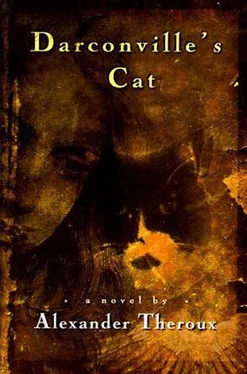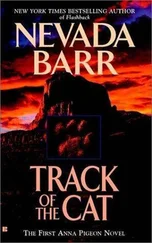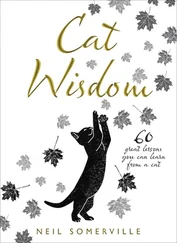Growing depressed, Miss Trappe suggested she resume showing Darconville the town she simultaneously warned him against, arguing, convincingly, that a writer in staying too long would go mad there. The suicide rate in Quinsyburg, she said, was — she stopped and, in the reflection of a window, retied under her chin the wide straw hat.
“High?”
The crabapple wrinkled. “Astronomical.”
I will stay here for only a year, thought Darconville, and try to do my work. He told Miss Trappe he’d take the chance, but she told him that Mrs. Battle said chance is nothing. And yet, he reasoned, wasn’t the price for privacy anonymity? Un altro, un altro, gran’ Dio, ma più forte .
They now stood in front of the Wyanoid Baptist Church, a plain white affair with the usual homiletic menu out front and at the peak of its steeple, spiritual guerdon to a whole community, a weathervane in the shape of a metal cricket (has anyone ever figured that one out?).
Quinsyburg, Va. was one of those places where pulpit and drum ecclesiastick were beat with a fist instead of a stick, and whatever the persuasion — whether Wycliffites, Old Order Bunkers, Stundo-Baptists, or the International Church of the Foursquare Gospel— religion was religion as long as it had been scoured of any whim or wishet that flirted with Rome or ritual or racial equality. It was, in fact, a reactionary little town filled with stiff-nosed Galatians, circuit-riders, and reformers with upsidedown bibles, all looking up hill and down dale for a chance to save someone’s soul. The place teemed with Presbyters Writ Large, and on every Sunday this very church, become a hotbed of tracasseries and dissent, swelled to overflowing with singing, ringing wonglers, diehards from the U.D.C. looking for fellowship, and hundreds of bag-in-hand geriatrics with voices like hoopoes who preferred their theology muscular, their ministers mousy, and their church quite definitely in the majority.
Darconville bent forward to read the little marquee — and cocked an eyebrow. It read:
Sermon
”Did God Wink?” (Acts 17:30)
W. C. Cloogy, Pastor and Evangelist
Wyanoid Baptist Church
Bethel of Blessings
God help us, thought Darconville, who quite frankly, if somewhat surprisingly, had yet to be convinced that the Edict of Nantes hadn’t perhaps caused more trouble on earth than original sin.
Darconville and Miss Trappe hadn’t gone two feet when a woman came suddenly shooting out of the side-door of the church. She looked like the wife of a manciple, frazzled, with shocked eyes. Clutching a fistful of pamphlets, she identified herself as an evangelist’s helper and quickly began batsqueaking about God’s love, in support of which topic she swiftly presented to each one of her little tracts: “Crumbs from My Table” by W. C. Cloogy, Evangelist. As all three stood there, two bewildered, the third — intense with eyeshine — spontaneously improvised a wee sermonette on The Deluge, she playing Noah, her voice the animals it knew, and the air was soon filled with a most ingenious array of barks, oinks, croaks, snarls, cheeps, and moos, all articulating the same curious complaint, that this world was too corrupt and wretched to live in, the unavoidable implication of which seemed to be that the lesser creatures of this earth shared, if not the same size or shape, then at least the same agony and accent. And when, she asked, would they make their assent to faith? Did they know Jesus for their personal savior? Were they willing to be born again?
And, pray, were they in need of revival?
Revival ? The word sprouted a capital letter. It was bad enough, thought Darconville, to suggest anything to perfect strangers, but to dare to suggest one of those punk kick-ups and premillennial antihomologoumena? He had a sudden vision of all those bible-thumping wompsters, unscrupulous sharpers, and pigeon-faced decretalicides who, having weaseled into the narrow existentialate of the American South, had for so long impunitively burked reason, honesty, and truth and set up false gods to whom, like rats toward platters of meazled pork, the illiterate faex populi had swarmed only to be bilked, beggared, and buccaneered right on the spot. Was that religion? Miss Trappe, agreeing, said she would rather take her own life — at least that way, she added, she would not need to be scared anymore about what would happen if she didn’t. They walked away in silence.
Then Miss Trappe adjusted her spectacles, waited until her optic axes grew coincident, and took one last painful look to the far end of Main St. She shook her head.
“You know,” she said, “a thought just crossed my feeble old mind, dear.”
“Yes?”
“Well,” offered Miss Trappe, “the act of committing suicide may be very easy.”
Darconville gently took her arm.
“When you do it,” she said, shrugging and looking up at him with eyes pale as air, “just simply pretend it isn’t you!”
There was nothing Darconville could find to say, search his heart though he might. They slipped behind the courthouse and walked through an alley past the Quinsyburg jail where, high above their heads, they both noticed a series of black fists gripping the bars of the grills. A lonesome song drifted from one of the cells across the afternoon.
”What a beautiful mornin’ that will be,
Let my people go;
When time breaks up in eternity,
Let my people go.”
Miss Trappe halted again on the edge of a thought, the shadow of the building darkening her face. She looked up at him like Van Eyck’s pinchfaced Amolfini in horizontal hat, and as Darconville again took her arm — the skin seemed to crumble between his fingers, like burial earth — she stared past him and placed a finger on her chin.
“And you know, the strangest thing of all is,” said she, “you may not even have to pretend.”
It was clear, Darconville now saw, that from her lugubrious pronouncements Miss Trappe had seen to more terrible depths than the town at first glance afforded, and, asking her various questions, he began to learn more of what oppressed her. Quinsyburg was a closed account. It was a place, apparently, reduced to total irrelevance, to terms that, while having fallen to the category of the tedious and the negligible, were yet maintained in the hollowness of their churchianity, the religion, deportmentalized and moralistic, of the Prodigal Son’s brother, and reinforced in a terrible irony of reciprocity by the cynical and nonconformist whingeings of Luther, Melanchthon, Bucer, Pomeranus, Knox, Flacius Illyricus, and various other sons of revolt. If it seemed, at first, the kind of town that customarily salted its appeal with a sort of grassroots neighborliness, the notion didn’t last. Insiders were in, outsiders out. When and if friendship were shown, she said, it was the type of loving-kindness that uncomfortably verged on tyranny. They wanted not so much to convince you of their opinions as to deprive you of your own, and typical of so many other one-crop regions that had taprooted out of the normal world — pockets of homogeneity bypassed by culture and change — most of its townsfolk were in the grip of an acute xenophobia that filled the vocabularies of their villageois language with a repetition of paranoid they/them pronouns and convinced them that beyond the particular borders of their town spread the etceterated sloughs of godlessness where people drank swipes, backslid, and gambled away their wives. They stuck together in the same way that piranhas, seeing certain maculate spots of identification, would not attack each other. Politically, the community was so far to the Right it jimmied the Left. In terms of actual religious belief, Quinsyburg’s, oxymoronically, was in fact a civic faith, for spiritual obligation had devolved to the concept of good citizenry, a quo ad sacra invariably performed as an endorsement for, and in the name of, the American Way of Life. Knowledge to them was the parent of malice. Ideas they met with derision, truth with suspicion, and differences with fear. For any other way of life one couldn’t raise their temperatures a therm. They lived, they knew, the way it was done, and the devil, the great disturber of our faith in this world, couldn’t raise in the townsfolk there one scruple whatsoever leading to alternatives. They will be there yesterday. They were there tomorrow. They are.
Читать дальше












